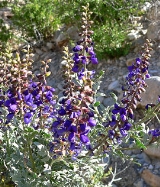
Psorothamnus
Encyclopedia
Psorothamnus is a genus of plants in the legume family
. These are shrubs and small trees. Many are known by the general common name indigo bush. Some are referred to as daleas, as this genus was once included in genus Dalea
. These are generally thorny, thickly branched, strongly scented bushes. Most species bear lupinlike
raceme inflorescences
of bright purple legume flowers and gland-rich pods. Psorothamnus species are native to the southwestern United States
and northern Mexico.
Species:
Fabaceae
The Fabaceae or Leguminosae, commonly known as the legume, pea, or bean family, is a large and economically important family of flowering plants. The group is the third largest land plant family, behind only the Orchidaceae and Asteraceae, with 730 genera and over 19,400 species...
. These are shrubs and small trees. Many are known by the general common name indigo bush. Some are referred to as daleas, as this genus was once included in genus Dalea
Dalea
Dalea is a genus of flowering plants in the pea family, Fabaceae. Members of the genus are commonly known as prairie clover or indigo bush. Its name honours English apothecary Samuel Dale .-Species:-Formerly placed here:...
. These are generally thorny, thickly branched, strongly scented bushes. Most species bear lupinlike
Lupin
Lupinus, commonly known as Lupins or lupines , is a genus in the legume family . The genus comprises about 280 species , with major centers of diversity in South and western North America , and the Andes and secondary centers in the Mediterranean region and Africa Lupinus, commonly known as Lupins...
raceme inflorescences
Raceme
A raceme is a type of inflorescence that is unbranched and indeterminate and bears pedicellate flowers — flowers having short floral stalks called pedicels — along the axis. In botany, axis means a shoot, in this case one bearing the flowers. In a raceme, the oldest flowers are borne...
of bright purple legume flowers and gland-rich pods. Psorothamnus species are native to the southwestern United States
Southwestern United States
The Southwestern United States is a region defined in different ways by different sources. Broad definitions include nearly a quarter of the United States, including Arizona, California, Colorado, Nevada, New Mexico, Oklahoma, Texas and Utah...
and northern Mexico.
Species:
- Psorothamnus arborescensPsorothamnus arborescensPsorothamnus arborescens is a species of flowering plant in the legume family known by the common name Mojave indigo bush.-Distribution:...
- Mojave indigo bush - Psorothamnus emoryiPsorothamnus emoryiPsorothamnus emoryi, syn. Dalea emoryi, common names dyebush, white dalea, or Emory's indigo bush, is a perennial legume shrub or subshrub common to the desert mesas of the southern part of the U.S. states of Arizona and California, and regions of the Mexican state of Baja...
- dyebush, Emory's indigo bush - Psorothamnus fremontiiPsorothamnus fremontiiPsorothamnus fremontii, is a perennial legume shrub, common to the southwestern United States and northern Mexico in the states of California, Nevada, Utah, and Arizona, Sonora, and Baja California.-References:* -External links:*** - Lady Bird Johnson: "Wildflower Center"...
- Fremont's indigo bush - Psorothamnus kingii - King's dalea
- Psorothamnus polydeniusPsorothamnus polydeniusPsorothamnus polydenius is a species of flowering plant in the legume family known by the common name Nevada dalea. It is native to the deserts of the southwestern United States from the Mojave Desert in California to Utah.-Description:...
- Nevada dalea - Psorothamnus schottiiPsorothamnus schottiiPsorothamnus schottii is a species of flowering plant in the legume family known by the common name Schott's dalea. It is native to the Sonoran Deserts of northern Mexico and adjacent sections of Arizona and the Colorado Desert in California....
- Schott's dalea - Psorothamnus scoparius - broom dalea
- Psorothamnus spinosusPsorothamnus spinosusPsorothamnus spinosus, known as the Smokethorn, Smoketree, Smoke tree, Indigobush, Smokethorn dalea, and Corona de Cristo, is a perennial legume tree common to the desert washes of the southern part of California, Arizona, and most of Baja California, including islands in the northern Sea of Cortez-...
- smoketree, smokethorn - Psorothamnus thompsoniae - Thompson's dalea

